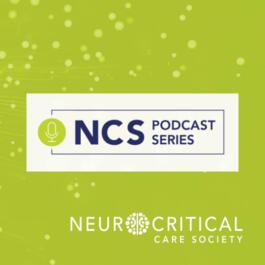
Neurocritical Care Society Podcast
The goal of the Neurocritical Care Society Podcast is to summarize some of the latest content and cutting edge research published in the journal, Neurocritical Care, official journal of the Neurocritical Care Society. Episodes are produced regularly and feature interviews with the top researchers around the world in the fields of neurology, critical care and neurosurgery.
Show episodes
In this episode of the NCS Podcast Perspectives series, Nicholas Morris, MD, is joined by Eelco Wijdicks, MD, PhD, professor of neurology at Mayo Clinic and chair of the Division of Critical Care Neurology. A pioneer of neurocritical care, Dr. Wijdicks reflects on training in Rotterdam, fellowship at Mass General under
In this episode of the NCS Podcast Hot Topics series, host Dr. Nicholas Morris speaks with Dr. Wendy Ziai, professor of neurology at Johns Hopkins and senior editor for Neurocritical Care, and Dr. Richard Choi, neurointensivist at MedStar Franklin Square and social media editor for the journal. This episode also introd

CURRENTS: Seizure Code Strategy: Improving Treatment Times and Clinical Outcomes in Patients With Urgent Epileptic Seizures
In this episode of the NCS Podcast Currents series, host Lauren Koffman, DO, MS, speaks with Camilo Espinosa-Jovel, MD, and Clio Rubinos, MD, MS, FACNS, about their recent Currents article on the Seizure Code strategy. They share how their collaboration began across continents, the origins of the seizure code and the i

CURRENTS: The Role of Ultrasound Guided Lumbar Puncture in the Neuroscience Intensive Care Unit: A Review and Case Presentation
In this episode of the NCS Podcast Currents series, host Lauren Koffman, DO, MS, speaks with Swarna Rajagopalan, MD, MS, associate professor of neurology Cooper University Health Care about her recent co-authored Currents article on the role of ultrasound guidance in performing lumbar punctures in the neuroscience ICU.

PERSPECTIVES: Chere Chase-Gregory, MD, MHS, on Bridging Health Equity and Neurocritical Care
In this episode of the NCS Podcast Perspectives series, Nicholas Morris, MD, is joined by Chere Chase-Gregory, MD, MHS, senior vice president and chief health equity officer at Novant Health and a practicing neurointensivist. Dr. Chase-Gregory, also an adjunct faculty member at the University of North Carolina and foun
In this episode of the NCS Podcast Masterclass series, hosts Jon Rosenberg, MD, and Stephan A. Mayer, MD, FCCM, FNCS, are joined by Carolina B. Maciel, MD, MSCR, and Katharina Busl, MD, MS, professors of neurology at the University of Florida. They explore the evolution of opioid-sparing pain management strategies in p